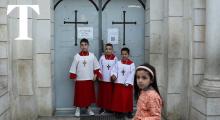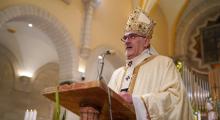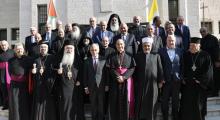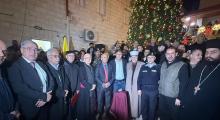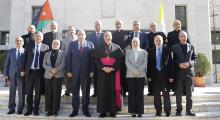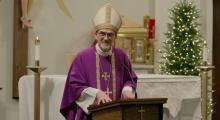Issued by the Catholic Center for Studies and Media - Jordan. Editor-in-chief Fr. Rif'at Bader - موقع أبونا abouna.org
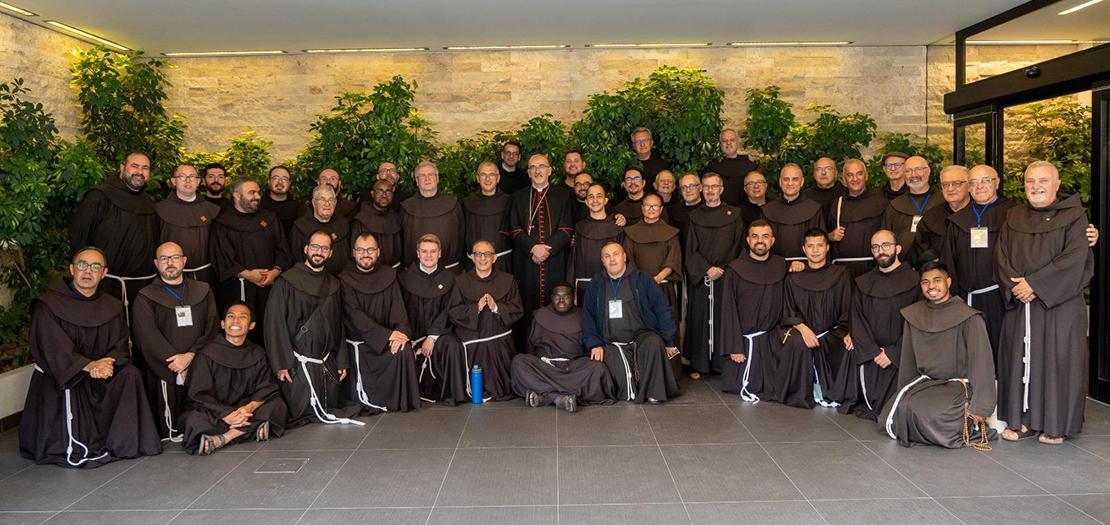
Following is the text of the homily delivered by Cardinal Pierbattista Pizzaballa, Latin Patriarch of Jerusalem, marking the canonization of the martyrs of Damascus dated October 21, 2024:
Most Reverend Excellencies,
Most Reverend Father Custos,
Dear brothers and sisters,
may the Lord give you peace!
Yesterday, we had the immense joy of witnessing the canonization, alongside others, of the martyrs of Damascus. Today, we gather to give thanks to the Lord for their powerful testimony, now officially recognized and declared by the authority of the Church as a model for all, through the proclamation of the Holy Father, Pope Francis.
We are familiar with their story, as well as the historical and social context that led to their martyrdom. I will not repeat what we have already heard over the past few days. At the time, political fragility — marked by the decline of the Ottoman Empire — opened the door to international interference, competing interests, and insecurity surrounding collective identity. These elements, often intertwined with religious and ethnic tensions, led to outbreaks of violence, in this case, anti-Christian violence. Tragically, this kind of drama has repeated itself throughout history, and even today, the Middle East is facing circumstances that are, in many ways, not so different from those past conflicts.
However, we are not here today to pass historical judgment on the past or to conduct a political analysis of the present. We are here to give thanks to the Lord for the grace of martyrdom and to reflect on what these martyrs teach us today — especially as Christians of the Holy Land, the Middle East, and the Church as a whole.
The canonization of saints is not just about glorifying figures of the past — though that is an important part of our tradition. It is also an opportunity for us to pause, reflect, and ask: Why do martyrs hold such a revered place in our spiritual and liturgical life or, simply put, What do the martyrs of Damascus and those of all times say to us today?
First and foremost, it is essential to recognize that honoring martyrs and giving thanks for their witness does not mean celebrating their death or the evil done against them. Christian faith is about life, not death. The Christian meaning of sacrifice does not concern death, but life.
We Christians are called to bear witness through our actions, of our love and of our contribution to society, by offering hope to our neighbors, and by opening paths to peace. God’s greatest gift is life, and it should always be our primary choice.
Martyrdom, therefore, is not about death; in fact, it is a choice — a choice expressing profound love and supreme loyalty to what we hold most dear. This is why martyrdom stands as the ultimate testimony of faith. Martyrs show us, through their lives, the power of faithfulness to God — one that remains unshaken, even in the face of death.
Today’s Gospel begins with two deeply significant words: “my friends” and “do not be afraid” (Lk 12:4). Elsewhere, Jesus says, “No one has greater love than this, to lay down one’s life for one’s friends.” (John 15:13) Our brothers, the Friars Minor and the Massabki brothers, shed their blood for Jesus, not out of a sense of heroism, but out of pure love. Their friendship with Jesus was so deep that they embraced His intentions, His feelings, and ultimately, they staked everything on Him. In the end, they gave their lives out of love for Him. They did not “fear those who kill the body, and after that can do nothing more.” (Luke 12,4)
Faith, in short, was not for them a garment to put on in the right occasions, but what sustained their very life. They would have died if they had renounced faith, and not the other way around. Paradoxically, in being with Christ even in the face of the danger of death, they said yes to life, the life that no one can take away from us.
Martyrdom is also a form of prophecy, as it reveals a new and different way of responding to violence and evil, which have always been, and will continue to be present in our world. The desire for good that exists in every person and society must inevitably confront the reality of evil — both within us and around us — and its impact on people and the world. We must not delude ourselves: the wheat and the tares will always coexist. Every believer, and every Christian community, must learn to face these realities with a Christian spirit.
The martyrs of all times teach us that the Christian way of confronting the power of evil in the world is through the cross. To stand with Christ on the cross means not being afraid of death, but keeping alive the desire for self-giving, free love, and forgiveness. Martyrdom, therefore, before being an act of heroism, is the Christian response to violence and evil. It rejects all forms of violence, denies any impulse for revenge, and stands with Christ on the cross — loving and forgiving.
One of the brothers, before being killed, tried to save the Eucharistic species of the tabernacle. And this reminds us of another teaching. Martyrdom can also be understood as Eucharistic act. If the Eucharist is the celebration of Christ’s commandment of love, the memorial of His death and resurrection, martyrdom shows its actualization in the reality of the world. Eucharist and martyrdom are not the same thing, but what we experience in the Eucharist can find its expression in martyrdom, where life is offered as a gift, in union with the death and resurrection of Christ.
The martyrs of all ages remind us to keep the essence of Christian originality alive. In the face of the world’s logic, which often values strength, superiority, victory, wealth, and power, the Christian response is one of self-giving, a desire for the good, the courage to forgive, a commitment to truth and justice, and love given freely. This is the strength of the meek, who inherits the earth (cf. Mt 5:5). For the world, martyrs are losers, just as Jesus was a loser on the cross. But for us believers they make the power of God visible. (Cf. 1 Cor 2:5)
At this moment, my thoughts are with our beloved Middle East, which is invaded by hatred, religious fanaticism, desires for revenge and retaliation, causing brutal violence — not only physical, but in many other forms. A context where so many Christians are denied opportunities and rights, are mistreated or simply forgotten, solely because they continue to follow Christ. In a sense, this is also a form of martyrdom.
We experience the illusion of believing that the use of weapons can create prospects for peace. Distrust, hopelessness, indifference to death and the pain of others are widespread. We have seen what all this has produced: rubble everywhere. The destruction before being material, it is moral, human. Outside interference, political or otherwise, has certainly played a role in this drift, as it did in the time of our martyrs, but it cannot justify all that has happened. We really should repent and ask God for forgiveness for all this. And we should also acknowledge that even religions in their institutional forms have not shown much freedom and capacity for prophecy.
It is in this context that the small Christian community in the Middle East continues to be tested, as it was during the time of the martyrs we remember today. From Gaza to Lebanon, Syria to Iraq, and from Egypt to Sudan, countless brothers and sisters in faith suffer every day. Yet, alongside these tragedies, we must also recognize the profound witness of their fidelity to Christ. We see strength and beauty in the testimony of many young Christians who, not many years ago, on the walls of churches destroyed by bombs, were able to write: "But we forgive you!". It is the Christian way of being in the Middle East.
Even today, then, despite the many challenges, the power of the cross also remains bright and gives us comfort. While it may be hard for us to change the world of politics, we will not make possible for the world of politics to change us. We will not allow the logic of violence to have the last word or be the only voice in the Middle East. This is the power of Christian witness, and the significance of its presence in these lands, marked by the life of Jesus and, throughout history, bathed in the blood of Christian testimony. We are called to be, through word and action, the luminous presence of Christ — the strength of life, the embodiment of brotherhood and welcome, the desire for the good of all, and the courage to forgive.
We must express our deep gratitude to our many brothers and sisters who, despite everything, have remained faithful to Christ and continue to show exemplary human solidarity to everyone, without distinction, giving themselves to help, support, and bring others closer together.
A special greeting goes out to our brothers and sisters in Syria, who cannot be with us today, but who are united with us in prayer. We thank them for their serene perseverance through these long years of war and poverty. The blood of the martyrs of Damascus has been, for them, the seed of a Christian community that, despite all odds, refuses to give up and continues to bear witness to life and brotherhood.
We also lift our prayers for our Lebanese brothers and sisters who have lost their lives under the bombs in recent days, and for our Christian community in the Holy Land — from Gaza to Bethlehem to Nazareth. Just as in the past, I am certain that even today, despite the raging storm of war, our small Christian community will continue to give a beautiful testimony of faith. (cf. 1 Tim 6:13) That testimony will be a commitment to truth and justice, in collaboration with men and women of all faiths who are unafraid to work together toward building a future of peace.
May the Most Holy Virgin, Mother of God and our Mother intercede and accompany our journey of faith, in Damascus, in Beirut, in Jerusalem and throughout the world. Amen.


